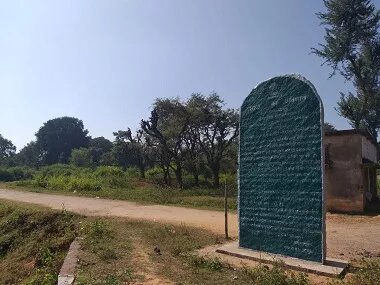Source – firstpost.com
Outsiders are met with fear and suspicion in Jikhelata, a village in Jharkhand’s tribal-dominated Khunti district, regardless of whether or not they are in uniform.
Police visits — and the possible use of excessive force — have become frequent since violence erupted in a neighbouring village over the locally-driven Pathalgadhi movement in June 2018. The movement, which seeks to assert the Adivasi community’s right to self-governance as defined in the Fifth Schedule of the Constitution, is also likely to have a bearing on the Assembly polls scheduled for 30 November.
The term pathalgadhi literally translates to ‘laying the stone’ which is a traditional custom of the tribal community to mark any significant event like births and deaths. However, since December 2017, its connotation is of a towering slab of stone, painted green, with sections of the Fifth Schedule written in white paint.
It was during an event to mark the pathalgadhi in Jikhelata and the neighbouring Ghagra village that a face-off between the police and locals escalated into violence, resulting in the death of one person and leaving several injured. In retaliation, locals had held four policemen captive, demanding talks with the authorities, and were accused of abduction. There have been repercussions from the incident in Ghagra on various aspects of the locals’ lives, including livelihoods.
“During the search operations for the missing policemen, they entered our homes and even beat up those of us who weren’t at the meeting,” said the locals, all of whom asked to remain anonymous, fearing police action. Having fled from their villages for two months in the middle of the farming season, they were unable to sow their crops in time for the monsoon in July and August. “We were left with no food and had to take up labour for some source of income. We only sow once a year, so we survived the past year by helping each other out, sharing with each other,” they said.
However, residents in villages like Jikhelata, Ghagra, Bhadna and Kevra said that they face a dual threat from the police and Pathalgadhi activists. “Sometimes, we are forced to join Pathalgadhi meetings, which then attract the ire of the police,” a resident of Kevra said.
“We are forced to get involved even when we choose not to, and always get stuck between the two,” he added. This conflict is illustrated by the 26 FIRs that have been filed against countless locals in villages across the district for participating in the Pathalgadhi movement over the past two years. They are charged with sedition, among other offences.
Ranchi-based journalist Anand Dutt said that while the FIRs name four or five people, there are as many as 200 ‘unnamed’ accused in some FIRs. This is a loophole that could enable the police to entangle those who raise questions in the case. Locals in the Kevra village, who also refused to be named, say that a few of the village’s leaders were arrested under similar circumstances earlier this year.
Following an argument with the police stationed at a ‘camp’ in a school on the outskirts of the village in March 2018, one of the leaders was slapped with a FIR that claimed he had “threatened the personnel with lathis, and vandalised and stolen government property”, among other offences. He was also charged with sedition. On the other hand, the leader, who had gone to appeal “peacefully” on behalf of some residents who had complained of “injustices” by the police, said that the delegation led by him wasn’t even armed to begin with.
“We had gone only to speak, why would we carry anything? But they said we had done maar–peet. A few months later I got charged with similar violations in another FIR, and in February this year, they arrested me,” he said. He was released eight months later on 4 October, after a Ranchi High Court judge granted him bail. “Zabardasti fasa diya,” he said, sitting in the verandah of his house.
In Jikhelata, the topic of the upcoming election is met with a cacophony of complaints against the police’s behaviour and the apathy of all the parties. “Why should we vote when we are treated like this?” one of the residents demanded. There is palpable anger against the current BJP government under Chief Minister Raghubar Das. Das, the state’s first non-tribal chief minister and also the first to complete a five-year term, has been criticised for “anti-tribal policies”.
“We are scared because of how much they hit us last year. Most of us who got hit, including women, took at least two months to recover. If the current government wins again, we are anticipating a situation worse than this,” a resident said. However, BJP’s Nilkanth Singh Munda, the incumbent MLA of the Khunti Assembly constituency, said he wouldn’t be able to comment on the issue. Munda, a local is a three-time legislator from the seat.
The government’s attempts to tamper with land rights laws in an attempt to safeguard the Adivasi community’s interests, has also been met with resistance. “No matter which party is in power, if they try to dilute the laws like the Chhota Nagpur Tenancy Act, there will be ulgulan (revolution),” one of the leaders in Kevra village said.
He added that no candidate has raised the issue of land rights in election campaigns so far. “We are also angry with the current government because it keeps talking about development, but there hasn’t been any in our village. We only got working electricity this year, and that could be because of the upcoming election.”
Khunti, a Left Wing Extremism-affected district will vote on 7 December, which is the second phase of the five-phase Assembly election.
